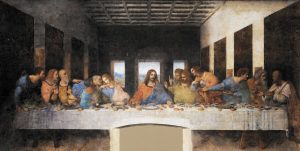Introduction
The Last Supper holds immense significance in Christianity as it is a pivotal event that took place during the final days of Jesus Christ. This sacred gathering has been commemorated and revered by Christians for centuries. It holds deep theological and symbolic meaning, representing key aspects of Christian faith and teachings. In this article, we will explore the significance of the Last Supper in Christianity, examining its historical context, symbolic elements, and spiritual implications.
 |
| Imagine from pixabay |
1. Historical Context
The Last Supper took place on the eve of Jesus’ crucifixion, during the Jewish festival of Passover. Jesus and his disciples gathered together in an upper room in Jerusalem to celebrate the Passover meal, which commemorates the liberation of the Israelites from slavery in Egypt. This setting adds historical depth to the significance of the Last Supper.
2. Symbolic Elements
The Last Supper holds several symbolic elements that convey profound meaning:
a) Bread and Wine
During the Last Supper, Jesus took bread and wine, blessed them, and shared them with his disciples, saying, “This is my body” and “This is my blood.” These acts symbolize the impending sacrifice of Jesus’ body and blood on the cross for the redemption of humanity. The bread and wine also represent the central sacrament of the Christian faith, the Eucharist or Holy Communion, where believers partake in remembrance of Jesus’ sacrifice.
b) Washing of the Feet
Another significant element of the Last Supper is the washing of the disciples’ feet by Jesus. This act of humility and servanthood demonstrates Jesus’ teachings on love, humility, and service. It serves as a powerful example for Christians to follow, reminding them of the importance of serving others with humility and selflessness.
3. Spiritual Implications
The Last Supper holds profound spiritual implications for Christians:
a) A New Covenant
During the Last Supper, Jesus referred to the wine as “the blood of the covenant.” This statement establishes a new covenant between God and humanity, replacing the old covenant established through Moses. Christians believe that through Jesus’ sacrifice, they enter into a new and everlasting covenant with God, marked by grace, forgiveness, and reconciliation.
b) Salvation and Redemption
The Last Supper foreshadows Jesus’ crucifixion and subsequent resurrection, which Christians believe brings salvation and redemption to humanity. By willingly offering himself as a sacrificial lamb, Jesus atoned for the sins of humanity, offering eternal life to those who believe in him. The Last Supper serves as a pivotal moment in the narrative of salvation history.
4. Lasting Lessons
The Last Supper imparts several lasting lessons for Christians:
a) Love and Service
Through the act of washing his disciples’ feet, Jesus exemplified the essence of love and service. Christians are called to follow his example by loving one another, serving those in need, and embodying humility in their interactions with others.
b) Unity and Fellowship
The Last Supper portrays the unity and fellowship that should exist among believers. Jesus gathered his disciples together, emphasizing the importance of communal worship, fellowship, and shared meals. This aspect of the Last Supper encourages Christians to come together as a community, supporting and encouraging one another in their faith journeys.
Conclusion
The Last Supper holds immense significance in Christianity, representing pivotal aspects of the faith. It serves as a historical event, a symbolic representation of Jesus’ sacrifice, and a spiritual reminder of salvation and redemption. The Last Supper also imparts lasting lessons on love, service, unity, and fellowship. As Christians commemorate the Last Supper, they are called to reflect on its profound meaning and apply its teachings in their lives. Through this sacred event, believers find inspiration, guidance, and a deeper connection to their faith.
